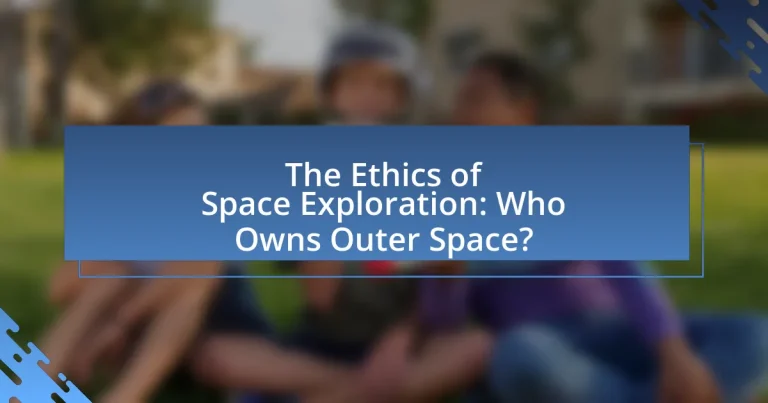The article examines the ethical considerations surrounding space exploration, focusing on issues such as environmental impact, resource ownership, and the potential contamination of extraterrestrial ecosystems. It highlights the significance of the Outer Space Treaty of 1967, which establishes that outer space is the province of all mankind and prohibits national claims of sovereignty. The article discusses the roles of various stakeholders, including national governments, private companies, and international organizations, in shaping space ownership debates and policies. Additionally, it addresses the moral responsibilities of nations, the implications of private sector involvement, and the need for international cooperation to ensure ethical exploration practices.

What are the ethical considerations surrounding space exploration?
The ethical considerations surrounding space exploration include issues of environmental impact, resource ownership, and the potential for contamination of extraterrestrial ecosystems. Environmental impact arises from the launch and operation of spacecraft, which can contribute to pollution and climate change on Earth. Resource ownership raises questions about the rights to exploit celestial bodies, as outlined in the Outer Space Treaty of 1967, which states that space is the province of all mankind and prohibits sovereign claims. Additionally, the risk of contaminating other planets with Earth-based microbes poses ethical dilemmas regarding the preservation of potential extraterrestrial life forms. These considerations highlight the need for responsible governance and international cooperation in space activities.
Why is the question of ownership in outer space significant?
The question of ownership in outer space is significant because it directly impacts international law, resource allocation, and the potential for conflict among nations and private entities. The Outer Space Treaty of 1967, signed by over 100 countries, establishes that outer space is the province of all mankind and prohibits any nation from claiming sovereignty over celestial bodies. This legal framework is crucial as it aims to prevent territorial disputes and ensure that space exploration benefits all humanity. The increasing interest in mining asteroids and other celestial resources raises further ethical and legal questions about ownership rights, highlighting the need for clear regulations to avoid conflicts and promote cooperative exploration.
What historical treaties address the ownership of outer space?
The historical treaties that address the ownership of outer space include the Outer Space Treaty of 1967, the Rescue Agreement of 1968, the Liability Convention of 1972, and the Registration Convention of 1976. The Outer Space Treaty establishes that outer space is not subject to national appropriation by claim of sovereignty, use, occupation, or any other means. This treaty has been signed by over 100 countries, including major space-faring nations, which reinforces its significance in international space law. The subsequent treaties build upon this framework by addressing issues such as the rescue of astronauts, liability for damage caused by space objects, and the registration of space objects, further clarifying the legal status of outer space and the responsibilities of nations.
How do these treaties influence current space exploration activities?
International space treaties, such as the Outer Space Treaty of 1967, significantly influence current space exploration activities by establishing legal frameworks that govern the use of outer space. These treaties promote the peaceful use of space, prohibit the militarization of celestial bodies, and assert that space is the province of all humankind, which encourages international collaboration and prevents territorial claims. For instance, the Outer Space Treaty mandates that space exploration must benefit all countries, fostering cooperative missions like the International Space Station, where multiple nations share resources and knowledge. Additionally, the Moon Agreement of 1979, although not widely adopted, emphasizes that the Moon and other celestial bodies are the common heritage of mankind, influencing discussions on lunar resource utilization and property rights. These legal frameworks shape policies and practices in space exploration, ensuring that activities align with ethical considerations regarding ownership and the shared responsibility of space resources.
What moral responsibilities do nations have in space exploration?
Nations have the moral responsibility to ensure that space exploration is conducted in a manner that promotes peace, sustainability, and the benefit of all humanity. This responsibility includes adhering to international treaties, such as the Outer Space Treaty of 1967, which emphasizes that space shall be used for peaceful purposes and that nations must avoid harmful contamination of celestial bodies. Furthermore, nations must consider the equitable sharing of benefits derived from space resources, ensuring that advancements in space technology and exploration do not exacerbate inequalities on Earth. The increasing presence of private companies in space exploration also necessitates that nations regulate these entities to uphold ethical standards and protect the interests of all global citizens.
How should nations balance exploration with environmental concerns?
Nations should balance exploration with environmental concerns by implementing strict regulatory frameworks that prioritize sustainability. These frameworks can include guidelines for minimizing ecological impact during exploration activities, such as adhering to the Outer Space Treaty, which emphasizes the responsibility of nations to avoid harmful contamination of space and celestial bodies. For instance, the European Space Agency has established protocols for planetary protection to prevent biological contamination, demonstrating a commitment to preserving extraterrestrial environments. Additionally, nations can invest in research and technology that enhance the efficiency of exploration while reducing environmental footprints, such as developing reusable launch systems. By integrating these measures, nations can ensure that exploration efforts do not compromise environmental integrity.
What role does international cooperation play in ethical space exploration?
International cooperation is essential for ethical space exploration as it fosters shared responsibility, promotes peaceful use of outer space, and ensures adherence to international laws. Collaborative efforts, such as the Outer Space Treaty of 1967, establish guidelines that prevent conflicts and encourage the equitable use of space resources among nations. Furthermore, joint missions and partnerships, like those seen in the International Space Station program, exemplify how countries can work together to advance scientific knowledge while upholding ethical standards. This cooperation mitigates the risks of unilateral actions that could lead to exploitation or militarization of space, thereby reinforcing a collective commitment to ethical principles in space exploration.

Who are the key stakeholders in the ownership of outer space?
The key stakeholders in the ownership of outer space include national governments, private space companies, international organizations, and scientific communities. National governments, such as the United States and Russia, assert jurisdiction over their space activities and assets, guided by treaties like the Outer Space Treaty of 1967, which emphasizes that outer space is the province of all mankind. Private space companies, including SpaceX and Blue Origin, are increasingly involved in space exploration and commercialization, raising questions about property rights and resource utilization. International organizations, such as the United Nations Office for Outer Space Affairs, facilitate cooperation and establish guidelines for the peaceful use of outer space. Lastly, the scientific community plays a crucial role in advocating for ethical standards and collaborative research in space exploration.
What roles do governments play in space ownership?
Governments play a crucial role in space ownership by establishing legal frameworks that govern the use and exploration of outer space. These frameworks are primarily influenced by international treaties, such as the Outer Space Treaty of 1967, which asserts that space is the province of all mankind and prohibits any nation from claiming sovereignty over celestial bodies. Additionally, governments regulate private space activities through licensing and compliance requirements, ensuring that commercial entities adhere to national and international laws. For instance, the Federal Aviation Administration in the United States oversees commercial space launches, reflecting the government’s authority in managing space activities. Thus, governments are essential in defining ownership rights, regulating access, and ensuring compliance with international agreements in the realm of space exploration.
How do national interests shape space exploration policies?
National interests significantly shape space exploration policies by prioritizing security, economic growth, and technological advancement. Countries often align their space initiatives with strategic goals, such as enhancing national security through satellite surveillance or developing technologies that can be leveraged for military purposes. For instance, the United States’ National Aeronautics and Space Administration (NASA) collaborates with the Department of Defense to ensure that space capabilities support national defense objectives. Additionally, nations invest in space exploration to stimulate economic growth; for example, the European Space Agency promotes commercial partnerships to foster innovation and job creation in the aerospace sector. Furthermore, countries like China and Russia have established ambitious space programs that reflect their geopolitical aspirations, aiming to assert dominance in space technology and exploration. These examples illustrate how national interests directly influence the formulation and direction of space exploration policies.
What are the implications of private companies entering space exploration?
The implications of private companies entering space exploration include increased innovation, reduced costs, and potential regulatory challenges. Private companies, such as SpaceX and Blue Origin, have demonstrated the ability to develop advanced technologies rapidly, leading to significant advancements in rocket design and launch capabilities. For instance, SpaceX’s Falcon 9 has reduced launch costs by approximately 30% compared to traditional government-operated launches. Additionally, the entry of private entities raises questions about ownership and resource exploitation in outer space, as the Outer Space Treaty of 1967 does not clearly define the rights of private companies. This ambiguity can lead to conflicts over resource claims and environmental concerns, as companies may prioritize profit over sustainable practices.
How do international organizations influence space ownership debates?
International organizations influence space ownership debates by establishing legal frameworks and norms that govern outer space activities. The United Nations, through treaties such as the Outer Space Treaty of 1967, asserts that space is the province of all humankind and prohibits national appropriation of celestial bodies. This treaty has been ratified by over 100 countries, reinforcing the principle that no single nation can claim sovereignty over outer space. Additionally, organizations like the International Telecommunication Union regulate satellite communications, which impacts how nations utilize space resources. These frameworks shape national policies and encourage collaborative approaches to space exploration, thereby influencing the ongoing discourse on space ownership.
What is the role of the United Nations in regulating outer space activities?
The United Nations plays a crucial role in regulating outer space activities through the establishment of international treaties and frameworks. The Outer Space Treaty of 1967, which is the cornerstone of international space law, was developed under the auspices of the UN and outlines principles such as the peaceful use of outer space, the prohibition of nuclear weapons in space, and the non-appropriation of outer space by any one nation. Additionally, the UN Office for Outer Space Affairs (UNOOSA) facilitates international cooperation in space exploration and promotes the development of space law, ensuring that activities in outer space are conducted in a manner that benefits all of humanity.
How do international agreements impact national space policies?
International agreements significantly shape national space policies by establishing frameworks for cooperation, regulation, and compliance among nations. For instance, the Outer Space Treaty of 1967, which has been ratified by over 100 countries, sets fundamental principles such as the peaceful use of outer space and the prohibition of territorial claims, compelling nations to align their policies with these international norms. Additionally, agreements like the Registration Convention and the Liability Convention further influence national legislation by requiring states to register space objects and assume liability for damages caused by their space activities, thereby promoting accountability and transparency in national space endeavors.

What are the implications of space ownership on future exploration?
Space ownership significantly impacts future exploration by establishing legal frameworks that dictate access and resource utilization. The Outer Space Treaty of 1967, which states that space is the province of all mankind and prohibits national appropriation, creates a complex environment for private and national entities seeking to explore and exploit extraterrestrial resources. As private companies increasingly invest in space exploration, the ambiguity surrounding ownership rights may lead to conflicts over resources, hinder collaborative international efforts, and necessitate new regulations to ensure equitable access. For instance, the rise of asteroid mining initiatives raises questions about property rights in space, potentially leading to competition that could stifle innovation and exploration.
How might space mining affect ownership debates?
Space mining could significantly complicate ownership debates by challenging existing international treaties and national claims to celestial resources. The Outer Space Treaty of 1967, which states that outer space is the province of all mankind and prohibits any nation from claiming sovereignty over celestial bodies, may be tested as private companies and nations seek to extract valuable resources like water, metals, and minerals from asteroids and moons. This potential for resource extraction raises questions about who has the right to exploit these resources and under what legal framework, leading to disputes over ownership rights and responsibilities. As nations and private entities invest in space mining technologies, the lack of clear regulations could result in conflicts similar to those seen during historical land grabs on Earth, emphasizing the need for updated legal frameworks to address these emerging challenges.
What resources are being targeted for extraction in outer space?
The resources being targeted for extraction in outer space include water, rare earth metals, and helium-3. Water is sought for its potential to support life and fuel missions, while rare earth metals, such as platinum and gold, are valuable for technology and manufacturing. Helium-3 is targeted for its potential use in nuclear fusion, which could provide a powerful energy source. These resources are identified based on their abundance in asteroids and other celestial bodies, with studies indicating that asteroids could contain significant quantities of these materials, making them economically viable for extraction.
What legal frameworks are needed to govern space mining activities?
Legal frameworks needed to govern space mining activities include international treaties, national regulations, and property rights agreements. The Outer Space Treaty of 1967 establishes that outer space, including celestial bodies, is not subject to national appropriation, which necessitates a framework for resource extraction that respects this principle. Additionally, the Moon Agreement of 1984, although not widely ratified, proposes that the Moon and other celestial bodies should be considered the common heritage of mankind, implying that benefits from space mining should be shared. National laws, such as the U.S. Commercial Space Launch Competitiveness Act of 2015, allow private entities to own resources extracted from asteroids, indicating a need for harmonization between national and international laws to avoid conflicts. These frameworks collectively aim to ensure that space mining activities are conducted responsibly, ethically, and in a manner that benefits all humanity.
What ethical dilemmas arise from potential colonization of other planets?
Potential colonization of other planets raises significant ethical dilemmas, primarily concerning the rights of extraterrestrial life forms, environmental preservation, and the implications of ownership. The ethical concern regarding extraterrestrial life stems from the uncertainty of its existence; if life is discovered, colonization could lead to its extinction, violating principles of biodiversity and ecological balance. Environmental preservation is another dilemma, as colonization efforts may disrupt alien ecosystems, similar to how human activities have harmed Earth’s environments. Furthermore, the question of ownership complicates ethical considerations, as current international space law, particularly the Outer Space Treaty of 1967, prohibits any nation from claiming sovereignty over celestial bodies, yet the potential for private enterprises to exploit these resources raises issues of equity and justice. These dilemmas highlight the need for a robust ethical framework to guide future space exploration and colonization efforts.
How does colonization challenge existing notions of ownership?
Colonization challenges existing notions of ownership by asserting control over land and resources without the consent of indigenous populations. This practice disrupts traditional systems of land stewardship and communal ownership, as seen in historical contexts like the colonization of the Americas, where European powers claimed territories inhabited by Native Americans, disregarding their established rights and relationships to the land. The imposition of foreign legal frameworks further complicates ownership concepts, as colonizers often introduced private property models that conflicted with indigenous practices of shared land use. This historical precedent illustrates how colonization redefines ownership, prioritizing the interests of colonizers over the rights of original inhabitants.
What responsibilities do explorers have towards extraterrestrial environments?
Explorers have the responsibility to protect and preserve extraterrestrial environments from contamination and degradation. This includes adhering to planetary protection protocols established by organizations such as NASA and the Committee on Space Research (COSPAR), which aim to prevent biological contamination of celestial bodies and ensure the integrity of scientific research. For instance, the Outer Space Treaty of 1967 emphasizes that space exploration should be conducted for the benefit of all humanity and mandates that explorers avoid harmful interference with other celestial bodies. By following these guidelines, explorers can minimize their impact on extraterrestrial ecosystems and maintain the scientific value of these environments for future research.
What best practices can guide ethical space exploration?
Best practices that can guide ethical space exploration include adherence to international treaties, prioritization of planetary protection, and engagement with diverse stakeholders. International treaties, such as the Outer Space Treaty of 1967, establish that space exploration should benefit all humanity and prohibit the appropriation of celestial bodies. Prioritizing planetary protection ensures that missions do not contaminate other worlds or harm potential extraterrestrial ecosystems, as outlined by the Committee on Space Research (COSPAR) guidelines. Engaging with diverse stakeholders, including scientists, ethicists, and the public, fosters transparency and inclusivity, which are essential for addressing the ethical implications of space activities. These practices collectively promote responsible exploration that respects both human and extraterrestrial environments.
How can nations collaborate to ensure responsible exploration?
Nations can collaborate to ensure responsible exploration by establishing international treaties and frameworks that govern activities in outer space. For instance, the Outer Space Treaty of 1967, signed by over 100 countries, sets foundational principles for the peaceful use of space and emphasizes that space exploration should benefit all humankind. Additionally, nations can engage in joint missions and share technological advancements, which fosters transparency and mutual accountability. Collaborative efforts, such as the Artemis Accords, promote responsible behavior in space exploration by outlining commitments to safety, sustainability, and the protection of heritage sites. These frameworks and agreements provide a structured approach to mitigate conflicts and ensure that exploration is conducted ethically and responsibly.
What guidelines should be established for private sector involvement in space?
Guidelines for private sector involvement in space should include regulatory compliance, environmental sustainability, and equitable access to resources. Regulatory compliance ensures that private companies adhere to international treaties, such as the Outer Space Treaty of 1967, which mandates that space activities must benefit all of humanity. Environmental sustainability is crucial to prevent space debris and protect celestial bodies, as highlighted by the increasing concerns over space junk, which currently numbers over 30,000 pieces in orbit. Equitable access to resources involves establishing frameworks that prevent monopolization of space resources, ensuring that emerging space economies can participate fairly, as emphasized by the United Nations Office for Outer Space Affairs. These guidelines collectively promote responsible and ethical private sector engagement in space exploration.


